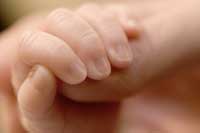Donor Sperm and Eggs
The issues involved in using donor sperm or eggs can create halachic problems. Artificial insemination has been performed for many years, and the question of the halachic validity of this procedure has been discussed by many sources. It is clear that more rabbinical authorities approve of artificial insemination if the husband's sperm is used (as long as it is not wasted in the process; there are special devices recommended by rabbis for collecting the sperm in as natural a way as possible). However, the idea of using donor sperm has not been accepted by many rabbis. While the use of donor sperm is not considered adultery per se (since sexual relations are not involved), it is still considered an abomination by many, and is strongly discouraged. Rabbinic sources generally agree that paternity is determined by who provides the sperm, so that a baby conceived from donor sperm would not, halachically, be considered the child of the infertile husband.
When an egg donor provides an egg for an infertile couple, the recipient, usually a sterile woman who cannot produce eggs, serves as the gestational and birth mother and she gives birth to and raises the baby as her own. In this case there are two categories of motherhood: a genetic mother, and a gestational/birth mother. These -- now separate -- functions can be performed by two different people, who may or may not be related to each other and may or may not have any connection with each other (other than their individual contributions to producing and raising the child).
There are rabbinical authorities who reject outright the idea of using donor eggs. Others believe that a woman may receive donor eggs as long as her husband has consented. The question of the mother is extremely complicated to answer. This is certainly a critical question as it impacts on the status and identity of the baby. According to traditional Judaism, the status of "who is a Jew" is determined by whether or not the mother is Jewish. In the case where the genetic mother and the gestational mother are the same person, then the issue is clear. What happens when the genetic mother is a different person from the gestational mother? Which mother is considered the mother for the halachic decision on religious status? If the genetic mother is not Jewish and the gestational mother is, what is the status of that infant? Rabbi Moshe Heinemann, Rabbinic administrator of Star-K Kosher Certification states unequivocally that if the egg is from a non-Jewish woman, then the baby is not Jewish. In this very stringent ruling, when a donor egg is used, the birth mother is not considered the halachic mother.
Other rabbinic authorities have also addressed this question and have concluded that there is halachic uncertainty regarding who is the mother. Rabbi Moshe Tendler writes: "the contributions of the gestational mother are quite consequential" (Pardes Rimonim, 1988). In fact, many halachic authorities regard the birth mother, rather than the egg donor, as having maternal status. The halacha on many issues relies on what can be readily observed with the naked eye. For instance, microscopic or small amounts of non-kosher contaminants in kosher foods, do not necessarily render the food non-kosher. Thus, the decision on maternity may be based on which mother gives birth (an action which is incontrovertible, and readily proven), rather than which mother provided the egg (a microscopic contribution, albeit a critical one). On the other hand, considering the important role Yichus, or inherited status, plays in some Jewish circles, genetic status could be of paramount importance, and perhaps the mother who provided the egg should determine Jewish status.
Men and Women Must Procreate
 The biblical commandment to have children is the first commandment given to Adam after he was created. A similar directive is given in Isaiah 45:18, which reads: "He did not create the world to be desolate, but rather inhabited." Since Adam was specifically charged with "Be fruitful and multiply" that positive commandment has been interpreted as an obligation on the part of the man to reproduce. The quote from Isaiah, commentators have explained, pertains both to men and women: thus women are included in the obligation to fill the world.
The biblical commandment to have children is the first commandment given to Adam after he was created. A similar directive is given in Isaiah 45:18, which reads: "He did not create the world to be desolate, but rather inhabited." Since Adam was specifically charged with "Be fruitful and multiply" that positive commandment has been interpreted as an obligation on the part of the man to reproduce. The quote from Isaiah, commentators have explained, pertains both to men and women: thus women are included in the obligation to fill the world.
It is clear that the scriptures have directed Jews to procreate, and this directive is so critical that Torah scholars agree it could be accomplished by natural or artificial means. The challenge of assisted reproductive technologies will be to sort out the complex relationships created by artificial reproductive processes, and to determine where to draw the line in terms of what techniques are ethical and permissible, which advances are questionable, and which are unacceptable.




